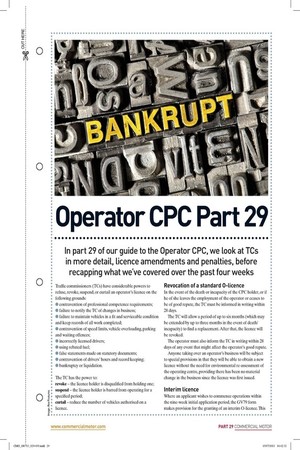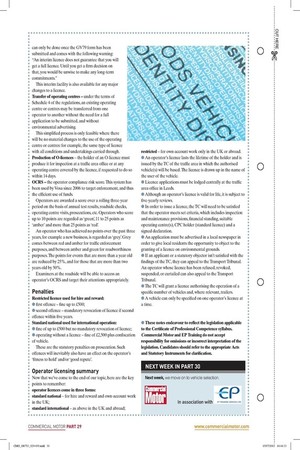Operator CPC Part 29 In part 29 of our guide
Page 22

Page 23

If you've noticed an error in this article please click here to report it so we can fix it.
to the Operator CPC, we look at TCs in more detail, licence amendments and penalties, before recapping what we've covered over the past four weeks Traffic commissioners (TCs) have considerable powers to refuse, revoke, suspend, or curtail an operator's licence on the following grounds: • contravention of professional competence requirements; • failure to notify the TC of changes in business; • failure to maintain vehicles in a fit and serviceable condition and keep records of all work completed; • contravention of speed limits, vehicle overloading, parking and waiting offences; • incorrectly licensed drivers; • using rebated fuel; • false statements made on statutory documents; • contravention of drivers' hours and record keeping; • bankruptcy or liquidation.
The TC has the power to: revoke — the licence holder is disqualified from holding one; suspend — the licence holder is barred from operating for a specified period; curtail — reduce the number of vehicles authorised on a licence. Revocation of a standard 0-licence In the event of the death or incapacity of the CPC holder, or if he of she leaves the employment of the operator or ceases to be of good repute, the TC must be informed in writing within 28 days.
The TC will allow a period of up to six months (which may be extended by up to three months in the event of death/ incapacity) to find a replacement. After that, the licence will be revoked.
The operator must also inform the TC in writing within 28 days of any event that might affect the operator's good repute.
Anyone taking over an operator's business will be subject to special provisions in that they will be able to obtain a new licence without the need for environmental re-assessment of the operating centre, providing there has been no material change in the business since the licence was first issued.
Interim licence Where an applicant wishes to commence operations within the nine-week initial application period, the GV79 form makes provision for the granting of an interim 0-licence. This can only be done once the GV79 form has been submitted and comes with the following warning: "An interim licence does not guarantee that you will get a full licence. Until you get a firm decision on that, you would be unwise to make any long-term commitments."
This interim facility is also available for any major changes to a licence.
Transfer of operating centres — under the terms of Schedule 4 of the regulations, an existing operating centre or centres may be transferred from one operator to another without the need for a full application to be submitted, and without environmental advertising.
This simplified process is only feasible where there will be no material changes to the use of the operating centre or centres: for example, the same type of licence with all conditions and undertakings carried through. Production of 0-licences — the holder of an 0-licence must produce it for inspection at a traffic area office or at any operating centre covered by the licence, if requested to do so within 14 days.
OCRS — the operator compliance risk score. This system has been used by Vosa since 2006 to target enforcement, and thus the efficient use of funds.
Operators are awarded a score over a rolling three-year period on the basis of annual test results, roadside checks, operating centre visits, prosecutions, etc. Operators who score up to 10 points are regarded as 'green', 11 to 25 points as 'amber' and more than 25 points as 'red: An operator who has achieved no points over the past three years, for example a new business, is regarded as 'grey: Grey comes between red and amber for traffic enforcement purposes, and between amber and green for roadworthiness purposes. The points for events that are more than a year old are reduced by 25%, and for those that are more than two years old by 50%.
Examiners at the roadside will be able to access an operator's OCRS and target their attentions appropriately.
Penalties Restricted licence used for hire and reward: • first offence — fine up to £500; • second offence — mandatory revocation of licence if second offence within five years. Standard national used for international operation: • fine of up to £500 but no mandatory revocation of licence; • operating without a licence — fine of £2,500 plus confiscation of vehicle.
These are the statutory penalties on prosecution. Such offences will inevitably also have an effect on the operator's 'fitness to hold' and/or 'good repute'.
Operator licensing summary Now that we've come to the end of our topic, here are the key points to remember: operator licences come in three forms: standard national — for hire and reward and own-account work in the UK; standard international — as above in the UK and abroad; restricted — for own-account work only in the UK or abroad.
• An operator's licence lasts the lifetime of the holder and is issued by the TC of the traffic area in which the authorised vehicle(s) will be based. The licence is drawn up in the name of the user of the vehicle.
• Licence applications must be lodged centrally at the traffic area office in Leeds.
• Although an operator's licence is valid for life, it is subject to five-yearly reviews.
• In order to issue a licence, the TC will need to be satisfied that the operator meets set criteria, which includes inspection and maintenance provisions, financial standing, suitable operating centre(s), CPC holder (standard licence) and a signed declaration.
• An application must be advertised in a local newspaper in order to give local residents the opportunity to object to the granting of a licence on environmental grounds.
• If an applicant or a statutory objector isn't satisfied with the findings of the TC, they can appeal to the Transport Tribunal. An operator whose licence has been refused, revoked, suspended, or curtailed can also appeal to the Transport Tribunal.
• The TC will grant a licence authorising the operation of a specific number of vehicles and, where relevant, trailers.
• A vehicle can only be specified on one operator's licence at a time.
• These notes endeavour to reflect the legislation applicable to the Certificate of Professional Competence syllabus. Commercial Motor and EP Training do not accept responsibility for omissions or incorrect interpretation of the legislation. Candidates should refer to the appropriate Acts and Statutory Instruments for clarification.








































